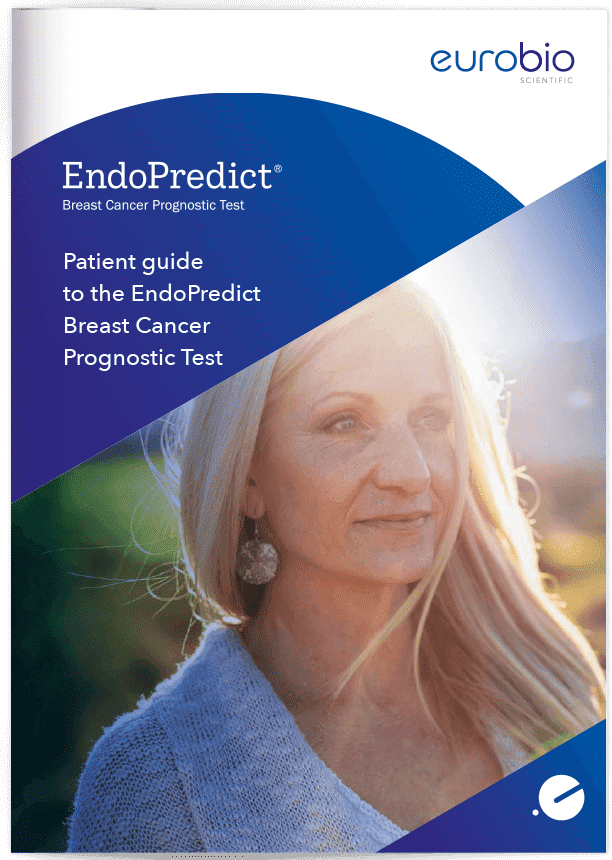Eurobio Oncology
EndoPredict®: Before the Test
Confused about which Breast Cancer Treatment and which Tests are Right for You?
After a breast cancer diagnosis, you’re not only faced with treatment choices – you’re also navigating a maze of diagnostic and prognostic tests. Which tools truly help? What will give you reliable answers for your personal situation?
It’s completely normal to feel overwhelmed. What matters most now is gaining clarity – so you can make confident, informed decisions.

Why is EndoPredict® Recommended for Me?
You might wonder why your doctor is suggesting this test. EndoPredict is used for people with early-stage, estrogen receptor-positive (ER+) and HER2-negative breast cancer. It goes beyond traditional tools to provide clear, personalized insights into your individual situation. EndoPredict helps answer key questions:
- How likely is it that my cancer will stay in the breast, or show up again elsewhere in the body - either soon or years from now?1
- Could 5 years of hormone therapy after surgery be enough for me?2
- Would I benefit from adding chemotherapy to my treatment plan?3
EndoPredict is designed to help answer these questions. It doesn’t just assess the probability of cancer recurrence – it helps clarify which treatment options are likely to make a meaningful difference in your outcome. That way, you and your doctor can make decisions based on your individual cancer biology, not just statistical averages.
For some patients, this means the reassurance of avoiding chemotherapy and its side effects – preserving energy, well-being, and quality of life. For others, it offers the confidence that additional treatment is truly necessary and worthwhile.
“Understanding all the options with my care team gave me a sense of calm and confidence in moving forward.”

Patient feedback
Eurobio Scientific Oncology
“We aim to help you and your care team better understand your options, giving you confidence in discussing possible treatment paths.”
- Taking the Next Step - Emotionally and Practically
Getting tested isn’t just a medical decision – it’s a deeply personal one. When your doctor mentions the EndoPredict test as part of your treatment planning, it can bring up a mix of emotions: uncertainty, anxiety, hope, or even relief. You may find yourself asking:
- What will this test really tell me?
- What if the test brings bad news?
- What does it mean for me, for my family, for my life?
These questions are not only valid – they’re important. That’s why this section is here: to guide you through this moment, not just clinically, but emotionally and practically.
Whether you’re still deciding whether to take the test, or preparing for the next steps, we want to support you in feeling informed, empowered, and supported.

Preparing Emotionally - You Don’t Have to Do This Alone
This phase of your cancer journey often carries a quiet emotional weight. You may look fine on the outside – going to work, caring for others – but inside, you’re carrying the strain of fear, decision-making, and uncertainty. It’s not just what happens at the hospital; it’s what happens at home, at night, in the pauses between conversations.
That’s why emotional preparation matters. Making space for your feelings, giving yourself permission to not have all the answers, and recognizing when you need support – all of this is part of the process.
Why Open Communication Matters
Having open, honest conversations with your family and friends can provide immense emotional relief, but starting those conversations can be daunting. You may feel the urge to protect others or worry about their reactions. But open, honest conversations – even if they’re difficult – can lead to stronger support and deeper connection.
This guide aims to help you communicate effectively with your loved ones, ensuring you get the emotional support you need while also helping them understand what you’re going through.
Effective communication is essential during times of medical uncertainty. While it’s tempting to shield our loved ones to protect them emotionally, sharing your experiences can lead to mutual emotional support and a stronger network.
Taking the first step can be the hardest. When and where should you talk? Who should be there? Here are some tips on starting the conversation:
- Choose a comfortable setting – You don’t need to have the perfect setting, but a quiet space without distractions can help.
- Decide what you want to disclose – Whether you want to explain the medical details or just talk about how you’re feeling, your words matter.
- Be prepared for different reactions – Some people will respond with immediate support. Others may need time. Their reactions are theirs – not a reflection of how you’re coping.
Deciding what to share can be a balancing act. Here are some pointers on what you could include:
- Your diagnosis and what it means
- Your treatment plan
- How they can support you
Everyone reacts differently. Some may offer immediate support, while others may need time to process the information. Here are some tips on how to manage and navigate these reactions:
- Honesty with Consideration: Be upfront but allow room for others’ emotional processing.
- Expect Varied Responses: Be ready for a range of emotional reactions, both positive and negative. Their reactions are more about them than you
- Establish Boundaries: Clearly define what kind of support you need and what you can’t handle.
Your well-being is the priority. It’s okay to set boundaries and let people know how much or how little you wish to discuss your medical condition at any given time. If something feels too personal or too draining to discuss, it’s okay to say so. You’re allowed to protect your energy.
Navigating Daily Life
Alongside your emotional world, there are practical realities: work, appointments, family logistics, and daily responsibilities. You might be wondering how to manage everything while also preparing for your decisions ahead.
A few gentle reminders:
You don’t have to do everything at once. Take things step by step, and allow yourself breaks when you need them.
It’s okay to ask for help – even with small things. Whether it’s meals, errands, or just someone to talk to, letting others support you can make a big difference.
You’re allowed to say no to extra responsibilities. Focusing on your health is a priority, and it’s okay to set boundaries.
Give yourself permission to rest. Caring for yourself is not a luxury – it’s essential.
Keep a simple plan. Writing down appointments, questions, and tasks can help reduce stress and make things feel more manageable.
Remember, taking care of yourself emotionally and practically is part of preparing for your treatment and your recovery. You don’t have to face this alone – support is available, and small steps add up.
Finding Support
If you need more help, search for patient support groups to aid you in this emotional journey. Even with family and friends around, it can help to connect with others who understand what you’re going through. Whether it’s a support group, a counselor, or a patient network – there are people who’ve been there, and who are ready to listen without judgment.
These trusted international organizations offer information, emotional support, and community for people recently diagnosed with early-stage breast cancer or going through treatment decisions.
BreastCancer.org
One of the most well-known platforms for breast cancer information, treatment options, and discussion boards.
Cancer Support Community
Offers global support services and emotional care, with online programs and resources.
Europa Donna The European Breast Cancer Coalition
Pan-European organization focused on advocacy, information, and support across Europe.
When You're Ready to Learn More
Taking the next step can feel overwhelming – but understanding what to expect may help ease some of the uncertainty.
If you’d like to know more about how the EndoPredict test is performed or how to interpret the results, we’ve prepared clear, accessible information to support you.
Want to Learn More at Your Own Pace?
- All key EndoPredict information in one brochure.
- Easy to read and revisit.
- Download to learn about your options.
References
- Filipits M. et al.: A New Molecular Predictor of Distant Recurrence in ER-Positive, HER2-Negative Breast Cancer Adds Independent Information to Conventional Clinical Risk Factors. Clin. Cancer Res. 2011
- Filipits M. et al.: Prediction of Distant Recurrence using EndoPredict among Women with ER+, HER2- Node- Positive and Node-Negative Breast Cancer Treated with Endocrine Therapy Only. Clin Cancer Res. 2019
- Sestak I. et al.: Prediction of chemotherapy benefit by EndoPredict in patients with breast cancer who received adjuvant endocrine therapy plus chemotherapy or endocrine therapy alone. Breast Cancer Res Treat. 2019

